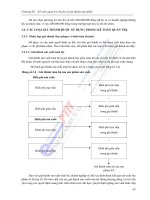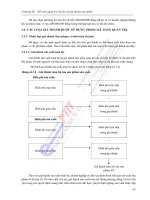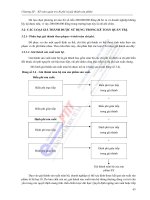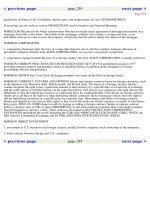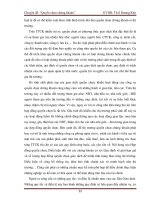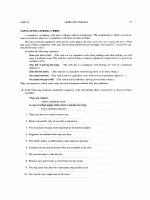Insider GuideKiller Investment Banking Resumes 2nd phần 4 pps
Bạn đang xem bản rút gọn của tài liệu. Xem và tải ngay bản đầy đủ của tài liệu tại đây (146.95 KB, 10 trang )
Have you
• Brought new customers and revenue into your company?
• Proven yourself as a self-starter who goes above and beyond requirements?
• Shown the ability to switch priorities and move quickly among different tasks?
• Set a challenging goal and achieved it?
• Shown attention to the details while juggling multiple tasks (i.e., didn’t let
things fall through the cracks)?
• Taken an innovative and efficient way to get something done?
If you haven’t done any of these things or anything remotely similar, you might
want to reconsider your desire to get into investment banking. These activities
are part and parcel of all investment banking work, and your ability to perform
well in a results-oriented environment will have a strong impact on your success
at most firms. The need for rather specific, often quantitative measurements of
your accomplishments should start you thinking about how to track and measure
your achievements if you don’t already.
32
UUssee nnuummbbeerrss ttoo qquuaannttiiffyy yyoouurr rreessuullttss
GGoooodd::
Team leader responsible for reducing department expenses.
BBeetttteerr::
Led team of four in reducing department expenses by $30,000.
BBeesstt::
Led team of four in successfully reducing department expenses by 25 percent
in just 6 months.
PPuutt yyoouurr ccoonnttrriibbuuttiioonn iinnttoo ppeerrssppeeccttiivve
e
GGoooodd::
Cut report preparation time from 3 to 2 days.
BBeetttteerr::
Cut report preparation time by 33 percent, allowing the firm to send out
customer statements earlier in cycle. Resulted in improved customer service.
WetFeet Resume Tips
Teamwork
Teamwork, with clients and peers, is a critical component of most, if not all,
assignments. Investment bankers constantly work in teams—deal teams, sales
teams, recruiting teams, and so on. Firms look for people who can work effec-
tively with and inspire others toward a common goal.
Have you
• Been a member of a sports team, study group, or committee?
• Worked effectively with people whose work styles differ from yours?
• Inspired others to take action in an unstructured situation?
• Taken on the role of a team leader or player as needed?
Of course you have! We don’t know of any candidate, particularly one at the
business school level, who hasn’t been involved in working with a team (love
those study groups!). Identify the teams and/or groups you’ve been a part of
(there is a difference between the two—teams form around a common goal)
and think about the role you typically play. If you’ve proven your ability to play
a productive role as a team member or, better yet, to effectively lead a team,
highlight it. In your interview you may be quizzed on your team involvement,
the type of role you tend to play on a team, or how you’ve worked with a team
to identify and solve a problem.
33
Basic Resume
Don’ts and Dos
So now you know the I-banker’s preferred content and format, and you’ve done
some soul-searching and come up with your perfect resume, right? Before you
plaster it on electronic bulletin boards and send a mass mailing to every firm on
the Street, check out and avoid the mistakes commonly found in resumes and
cover letters. Some common resume mistakes can be turned into assets. Follow
these tips for building a stronger, more refined resume:
Don’t use vague qualitative terms such as “large” or “many” as these leave the
reader with questions about specifics.
Do use numbers where appropriate to clearly describe your accomplishments, as
in “led a team of nine sales reps.”
Don’t waste resume space with frivolous information, such as “I like cheese.”
Do include personal information that is relevant and gives the reader a better
understanding of who you are.
Don’t try to differentiate yourself with unconventional format or tactics such as
graphics and colored paper.
Do stick to a basic, clear format that helps the reader glean information quickly
and with minimal effort.
Don’t try to portray yourself as a jack-of-all-trades in the hope that something
will strike the reader’s fancy.
35
Do discuss your two or three strengths and illustrate them with experience and
achievement.
Don’t get caught in the passive voice trap, writing as if things happened to you.
“Went to Argentina to represent the firm …”
Do use the active voice with verbs that indicate you’re in charge.
Don’t even think of writing more than 1 page.
Do distinguish the important from the trivial in your background to fit the most
relevant and significant elements onto a single page.
Don’t e-mail an attachment.
Do paste an ASCII version with line breaks into the body of an e-mail.
Don’t rely on your resume alone to make you stand out from the masses.
Success in a job search is based on personal contact.
Do understand that a good resume can help you advance in the interview
process. A poor one can get you disqualified.
Mail Merge Morons and Other Big Offenders
We’ve talked a lot about what recruiters look for in resumes and cover letters.
Well, there are also lots of things they don’t like to see. If your resume fits one
of these descriptions, you run a high risk of a ding, no matter how strong your
background.
The Mail Merge Moron
Mail merge morons send in their resume and cover letter to Merrill stating how
much they would like to work for Lehman. As one insider says, “If they didn’t
36
take the time to even read their cover letter
before sending it, how will they be able to
produce flawless work once they’re here?”
Three words: proofread, proofread, proofread!
High Inflation Rates
Yeah, we know, everyone exaggerates to some
extent, but insiders tell us that a resume that
looks too good to be true probably is. There-
fore, most of them look at a glowing resume
with a heavy dose of skepticism. You need to sell yourself and showcase your
talents without going overboard. The biggest mistake insiders say that job
seekers make is the tendency to overstate experience. “I hate when candidates
overstate their actual abilities. Then they get into an interview, and it’s a joke. It
comes out pretty quickly.”
The Title Titillator
Title titillators think a fancy title will make their experience sound better.
Consider the very impressive-sounding title, “Director of Strategic Operations.”
What on earth does that mean? Any banker knows enough about how various
industries are structured to be suspicious of such a title. Go with “Director of
Business Development” instead. When in doubt, simplify so as to make your
role and responsibilities clearer, rather than more obscure.
The Liar
Frighteningly enough, many insiders say they have caught individuals lying about
everything from what degrees they’d earned to where they’d earned them to
where they’d worked. One remembers a candidate from a top finance school
who lied about being fluent in five languages, one of which was Swedish. It so
happened that his first-round interviewer was Swedish. When he began the
interview in his native language, the candidate could only blush and admit to
lying on his resume. Needless to say, he was not invited back for another
interview.
37
If they didn’t take
the time to even
read their cover
letter before sending
it, how will they be
able to produce
flawless work once
they’re here?
“ ”
Too Much of a Good Thing
Resumes lacking focus are big losers. They include mentions of membership in
seven different clubs without a leadership position in any of them; experience
in five industries in the past 4 years; and knowledge of marketing, sales,
manufacturing, finance, and information systems. Right!
Chek You’re Speling
“A typo is death,” one insider says. Even one error can disqualify you as a
candidate. “If you don’t check something as important as your own resume, it’s
an indication that you don’t have the diligence and attention to detail it takes in
this industry,” says one insider. Use your spell checker, but also be sure to
proofread carefully. Spell checkers won’t catch all typos (e.g., too vs. two) and
won’t check for other hazards such as misused contractions (your vs. you’re, it’s
vs. its). It’s always a good idea to have a friend or two read through your resume
before you send it out. Remember, many reviewers are just looking for a reason
to throw your resume into the ding pile.
Technology Hang-Ups
You may think e-mail is the best thing since the Pony Express, but that doesn’t
mean your recruiter does. Don’t expect the person on the receiving end to
fumble around with an attached file in a desperate quest to review your qualifi-
cations. Instead, paste an ACSII formatted version into the body of an e-mail
message. If you’re worried about the lack of formatting, send a hard copy as
well. Faxing is almost as fast as e-mail, and often more reliable, although it’s
definitely a good idea to follow up a faxed resume with an e-mail message to
make sure it was received in legible form.
38
39
A Word about Keywords
Keywords are almost always nouns or short phrases. They name the characteristics, skills, tools, training,
and experience of a successful candidate for a particular job. Make sure they’re included in your resume.
It’s likely that your resume will be entered into the firm’s online database. Just as when you perform an
Internet search and you view a list of hits, the resume database will scan your resume for certain keywords
entered by the recruiter, who then receives a report on number of hits. The more hits, the better your
chances that a recruiter will opt to read your resume.
Visit bank websites and check out the language used to describe training programs and job requirements.
Meet with investment bankers and listen to the words they use. Here’s a list to get you started:
Industry Terms:
Analysis Fortune 500 Result
Assumptions High yield Revenue
Bonds Industry group Sales
Capital markets Instrument Secondary offering
Corporate finance Investment Stock market
Data Investment banking Teamwork
Debt IPO Transaction
Equity Mergers and acquisitions Yield
Financial markets Percentage
Financial services Quantitative analysis
Personal Characteristics:
Analytical ability Goal-oriented
Balancing multiple responsibilities Multi-task
Client oriented Negotiation
Drive Persuasion
Follow-through Results driven
Buzzword Alert
40
Tool:
Bloomberg PowerPoint
Excel Spreadsheet
Financial modeling
Use with Caution:
These terms often tip off a reader that the writer is trying to puff, embellish, or add gloss.
consult sophisticated
strategy/strategic complex
liaison successful
recommend facilitate
work with “co”-anything
assist
Avoid at All Costs:
These words have become practically meaningless through overuse. Or they were never real words to
begin with. Either way, you can be sure that in whatever context you use them they will be “wrong” to at
least one reader. Our recommendation: Avoid them.
reengineering change management
value chain incentivize
methodological
Buzzword Alert (cont’d)
Resumes Reviewed
By this point you should have a pretty good idea of how an investment banking
firm handles its resumes, and you should have started thinking about how to pre-
sent your own qualifications. However, the final step remains. You have to take
your basic package of skills and experience and turn it into a compelling market-
ing piece. To illustrate many of the points we’ve offered so far, and to give you
ideas about how to improve your presentation, we’ve included sample resumes
and cover letters. (We’ve changed the names and other revealing information to
protect the guilty.) We selected an assortment of people from different backgrounds
and reviewed them as applicants for an investment banking position.
41
Resume 1: MBA with Traditional I-Banking Background
42
2
1
3
4
5
5
6
7
8
3
JAMES JONES
Westwood Plaza, Box 951481
Los Angeles, CA 90095
xxx-xxx-xxxx
,edu
EDUCATION
The Anderson School at UCLA Los Angeles, CA
MBA, Concentration in Finance and Entrepreneurship June 2003
Memberships: Investment Banking Club, Finance Club, Entrepreneur Association, Anderson Real Estate
Association
Service: Riordan Scholar Mentor, Challenge for Charity Organization
Sports Clubs: Squash, Golf, Ultimate Frisbee
University of Pennsylvania Philadelphia, PA
BA, English May 1998
Founding Member, Project Awareness: Organization dedicated to providing inner-city minority children
with positive role models from the business community
Awarded Outstanding Freshman Sailor, Pennsylvania Sailing Team
EXPERIENCE
Merrill Lynch & Co. New York, NY
Summer Associate, Investment Banking 2002
Designed complex leveraged buyout, recapitalization, valuation, merger and debt capacity analysis for
Merrill Lynch clients. Advised strategic and financial buyers on acquisitions, divestitures, restructurings and
leveraged buyouts.
Donaldson, Lufkin & Jenrette Securities Corporation New York, NY
Financial Analyst, Mergers and Acquisitions Group 1998-2001
Drafted sales force marketing materials for debt and equity offerings. Prepared company calculations,
including fairness opinions, based on discounted cash flow, comparable company, precedent transactions
and break-up value analyses. Created leveraged buyout and merger models to assess pro forma effects of
potential transactions on corporate earnings, capital structure, credit ratios and ownership. As a senior
Analyst, managed and mentored first-year analysts. Led University of Pennsylvania recruiting team.
Modeling tutor for Analyst Training Program. Promoted to Associate February 2001.
Merger and Acquisitions transactions: $450 million sell-side advisory for client with spin-off of real estate
and aircraft assets to former management; $300 million buy-side advisory and placement agent for $20
million private convertible preferred equity security to fund the acquisition.
Financing transactions: $600 million senior notes offering; $68 million secondary equity offering; $50
million private exchange fund offering; $50 million preferred stock offering.
ADDITIONAL
Sailing: Private Yacht Captain; Sailing Instructor
Fluent in Spanish
Active volunteer for Special Olympics and Street Project

